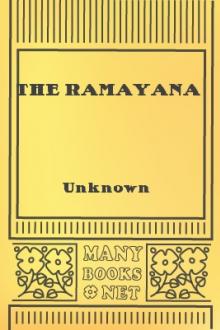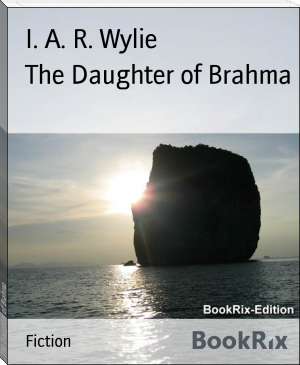The Ramayana - Valmiki (best ereader for epub txt) 📗

- Author: Valmiki
- Performer: -
Book online «The Ramayana - Valmiki (best ereader for epub txt) 📗». Author Valmiki
tei-l" style="text-align: left">Would blast her body, thus he spoke:
“Thou, who, of no dread sin afraid,
Hast Daśaratha's self betrayed,
Lord of the world, whose might sustains
Each thing that moves or fixed remains,
What direr crime is left thee now?
Death to thy lord and house art thou,
Whose cruel deeds the king distress,
Mahendra's peer in mightiness,
Firm as the mountain's rooted steep,
Enduring as the Ocean's deep.
Despise not Daśaratha, he
Is a kind lord and friend to thee.
A loving wife in worth outruns
The mother of ten million sons.
Kings, when their sires have passed away,
Succeed by birthright to the sway.
Ikshváku's son still rules the state,
Yet thou this rule wouldst violate.
Yea, let thy son, Kaikeyí, reign,
Let Bharat rule his sire's domain.
Thy will, O Queen, shall none oppose:
We all will go where Ráma goes.
No Bráhman, scorning thee, will rest
Within the realm thou governest,
But all will fly indignant hence:
So great thy trespass and offence.
I marvel, when thy crime I see,
Earth yawns not quick to swallow thee;
And that the Bráhman saints prepare
No burning scourge thy soul to scare,
With cries of shame to smite thee, bent
Upon our Ráma's banishment.
The Mango tree with axes fell,
And tend instead the Neem tree well,
Still watered with all care the tree
Will never sweet and pleasant be.
Thy mother's faults to thee descend,
And with thy borrowed nature blend.
True is the ancient saw: the Neem
Can ne'er distil a honeyed stream.
Taught by the tale of long ago
Thy mother's hateful sin we know.
A bounteous saint, as all have heard,
A boon upon thy sire conferred,
And all the eloquence revealed
That fills the wood, the flood, the field.
No creature walked, or swam, or flew,
But he its varied language knew.
One morn upon his couch he heard
The chattering of a gorgeous bird.
And as he marked its close intent
He laughed aloud in merriment.
Thy mother furious with her lord,
And fain to perish by the cord,
Said to her husband: “I would know,
O Monarch, why thou laughest so.”
[pg 137]
The king in answer spake again:
“If I this laughter should explain,
This very hour would be my last,
For death, be sure would follow fast.”
Again thy mother, flushed with ire,
To Kekaya spake, thy royal sire:
“Tell me the cause; then live or die:
I will not brook thy laugh, not I.”
Thus by his darling wife addressed,
The king whose might all earth confessed,
To that kind saint his story told
Who gave the wondrous gift of old.
He listened to the king's complaint,
And thus in answer spoke the saint:
“King, let her quit thy home or die,
But never with her prayer comply.”
The saint's reply his trouble stilled,
And all his heart with pleasure filled.
Thy mother from his home he sent,
And days like Lord Kuvera's spent.
So thou wouldst force the king, misled
By thee, in evil paths to tread,
And bent on evil wouldst begin,
Through folly, this career of sin.
Most true, methinks, in thee is shown
The ancient saw so widely known:
The sons their fathers' worth declare
And girls their mothers' nature share.
So be not thou. For pity's sake
Accept the word the monarch spake.
Thy husband's will, O Queen, obey,
And be the people's hope and stay,
O, do not, urged by folly, draw
The king to tread on duty's law.
The lord who all the world sustains,
Bright as the God o'er Gods who reigns.
Our glorious king, by sin unstained,
Will never grant what fraud obtained;
No shade of fault in him is seen:
Let Ráma be anointed, Queen.
Remember, Queen, undying shame
Will through the world pursue thy name,
If Ráma leave the king his sire,
And, banished, to the wood retire.
Come, from thy breast this fever fling:
Of his own realm be Ráma king.
None in this city e'er can dwell
To tend and love thee half so well.
When Ráma sits in royal place,
True to the custom of his race
Our monarch of the mighty bow
A hermit to the woods will go.”310
Sumantra thus, palm joined to palm,
Poured forth his words of bane and balm,
With keen reproach, with pleading kind,
Striving to move Kaikeyí's mind.
In vain he prayed, in vain reproved,
She heard unsoftened and unmoved.
Nor could the eyes that watched her view
One yielding look, one change of hue.
Canto XXXVI. Siddhárth's Speech.
Ikshváku's son with anguish torn
For the great oath his lips had sworn,
With tears and sighs of sharpest pain
Thus to Sumantra spake again:
“Prepare thou quick a perfect force,
Cars, elephants, and foot, and horse,
To follow Raghu's scion hence
Equipped with all magnificence.
Let traders with the wealth they sell,
And those who charming stories tell,
And dancing-women fair of face,
The prince's ample chariots grace.
On all the train who throng his courts,
And those who share his manly sports,
Great gifts of precious wealth bestow,
And bid them with their master go.
Let noble arms, and many a wain,
And townsmen swell the prince's train;
And hunters best for woodland skill
Their places in the concourse fill.
While elephants and deer he slays,
Drinking wood honey as he strays,
And looks on streams each fairer yet,
His kingdom he may chance forget.
Let all my gold and wealth of corn
With Ráma to the wilds be borne;
For it will soothe the exile's lot
To sacrifice in each pure spot,
Deal ample largess forth, and meet
Each hermit in his calm retreat.
The wealth shall Ráma with him bear,
Ayodhyá shall be Bharat's share.”
As thus Kakutstha's offspring spoke,
Fear in Kaikeyí's breast awoke.
The freshness of her face was dried,
Her trembling tongue was terror-tied.
Alarmed and sad, with bloodless cheek,
She turned to him and scarce could speak:
“Nay, Sire, but Bharat shall not gain
An empty realm where none remain.
My Bharat shall not rule a waste
Reft of all sweets to charm the taste—
The wine-cup's dregs, all dull and dead,
Whence the light foam and life are fled.”
Thus in her rage the long-eyed dame
Spoke her dire speech untouched by shame.
[pg 138]
Then, answering, Daśaratha spoke:
“Why, having bowed me to the yoke,
Dost thou, must cruel, spur and goad
Me who am struggling with the load?
Why didst thou not oppose at first
This hope, vile Queen, so fondly nursed?”
Scarce could the monarch's angry speech
The ears of the fair lady reach,
When thus, with double wrath inflamed,
Kaikeyí to the king exclaimed:
“Sagar, from whom thy line is traced,
Drove forth his eldest son disgraced,
Called Asamanj, whose fate we know:
Thus should thy son to exile go.”
“Fie on thee, dame!” the monarch said;
Each of her people bent his head,
And stood in shame and sorrow mute:
She marked not, bold and resolute.
Then great Siddhárth, inflamed with rage,
The good old councillor and sage
On whose wise rede the king relied,
To Queen Kaikeyí thus replied:
“But Asamanj the cruel laid
His hands on infants as they played,
Cast them to Sarjú's flood, and smiled
For pleasure when he drowned a child.”311
The people saw, and, furious, sped
Straight the the king his sire and said:
Free e-book «The Ramayana - Valmiki (best ereader for epub txt) 📗» - read online now
Similar e-books:





Comments (0)